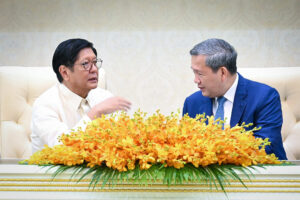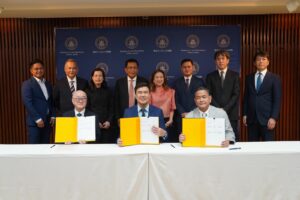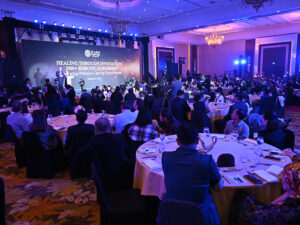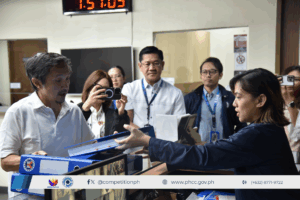By Erika Mae P. Sinaking
PHILIPPINE President Ferdinand R. Marcos, Jr. and Cambodian Prime Minister Hun Manet witnessed the signing of three key agreements, deepening the countries’ ties in police cooperation, higher education, and air connectivity.
“Our discussions today signal a new phase in the partnership between the Philippines and Cambodia,” Mr. Marcos said during a joint press conference with Mr. Hun Manet at the Peace Palace in Cambodia, according to a transcript from his office.
“One that embraces greater economic opportunities, deeper cooperation on matters of security, and the common resolve to uphold peace and stability in our region.”
Among the agreements signed was an amendment to a police cooperation memorandum of understanding (MoU) between the Philippine National Police and the Cambodian National Police. The amendment specifies additional areas of cooperation, such as human trafficking, arms trafficking, and cybercrime. It also includes an automatic renewal clause of the agreement.
Mr. Marcos said the agreements demonstrate a shared commitment to tackle “pressing challenges across borders: human trafficking, cybercrime, illicit drugs, and other transnational threats.”
He stressed that both governments aim for a swift, coordinated, and effective response to these issues.
The Philippine government repatriated three trafficking victims in March and four more in April from Phnom Penh after they were recruited through Facebook advertisements, which promised lucrative jobs as encoders and customer service representatives.
Moreover, the two leaders witnessed the signing of an MoU between the Philippines’ Commission on Higher Education and Cambodia’s Ministry of Education, Youth, and Sport for exchanges of officials between higher education institutions and training programs. The MoU will also facilitate cooperation in science, technology, and innovation.
“By broadening these linkages, we give our peoples more opportunities,” Mr. Marcos said, emphasizing the role of innovation in regional competitiveness.
The air services agreement, meanwhile, allows designated carriers to enter code-sharing alliances, operate charter flights, and exercise fifth freedom rights, enabling airlines to carry passengers or cargo between the Philippines and Cambodia with an intermediate stop in a third destination.
Mr. Marcos said that improved connectivity would translate to stronger cultural and economic ties.
More than 7,000 Filipinos currently live and work in Cambodia, mainly in the health, education, and development sectors.
The President called them “a wonderful bridge between our two countries and cultures,” adding that the agreements would support their role as “everyday ambassadors.”
Mr. Marcos also acknowledged Cambodia’s support for Manila’s upcoming chairship of the Association of Southeast Asian Nations (ASEAN) in 2026 and its push to secure a non-permanent seat at the United Nations Security Council.
“As fellow ASEAN Member States, we share the duty of safeguarding ASEAN centrality and unity amid regional and global challenges,” Mr. Marcos said.
Mr. Hun Manet said the talks reaffirmed Cambodia’s commitment to strengthen ties with the Philippines, calling the agreements “critical to national security, education development, and regional connectivity.”
The state visit, they added, highlights Manila’s push to expand partnerships within Southeast Asia at a time of heightened geopolitical competition in the region.
The Palace said the agreements take effect immediately after the exchange of documents, with implementing rules to be finalized by the agencies concerned.






